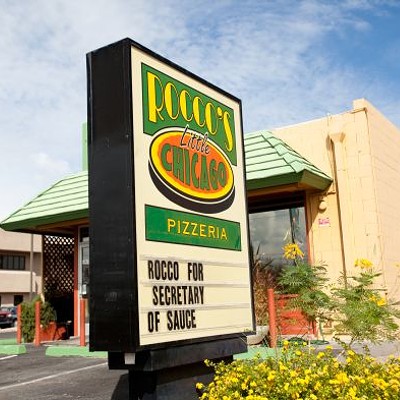But beyond sheer repugnance, cases of animal cruelty also raise plenty of red flags for cops, social workers and shrinks: Too often, it seems, animal abuse is just a warm-up for violence later turned on other people.
To help protect us all, the Humane Society of Southern Arizona spearheads the Animal Cruelty Taskforce of Southern Arizona, a broad-based contingent including everyone from police officers to veterinarians. And to spotlight larger patterns of cruelty, the Phoenix-based Arizona Humane Society is teaming with Steven Pitt and Associates, a top valley firm specializing in forensic psychiatry.
The notion that interpersonal violence often starts with animal abuse is well established, says Dr. Erin Spiers, a Steven Pitt psychologist. So is the direct connection between children who abuse animals and those who grow into violent offenders.
Animal cruelty "isn't the only marker," she says. "But when we look at risk factors for potential violence against people, a history of violence against animals is a tremendous red flag for us."
To hoist that flag even higher, Spiers and her colleagues will provide pro bono services to the Humane Society, assisting in campaigns batting animal cruelty and helping solve high-profile cruelty cases. They'll also lend law enforcement a hand in identifying abuse patterns.
"We bring a behavioral, psychological and psychiatric perspective," says Spiers. "It's the behavioral component to why people do these things, and how they do it. The type of cruelty they're inflicting upon animals is critical to understanding the offender--where they're coming from, why they're engaging in these behaviors."
Meanwhile, the Humane Society of Southern Arizona is licensed by the Arizona Department of Health Services to provide psychological and educational intervention for abusive youngsters. This program kicks in "particularly if there are children in the behavioral-health system who have animal cruelty in their history," says Marsh Myers, spokesman for the HSSA and a task-force leader. "It's not unusual for case workers to contact us and say, 'Hey, I've got this kid who's been abusing cats. What kind of program do you have available?'
"The same is true for the justice system," Myers says. "Now, if a child coming through that system has a history of animal cruelty, an automatic referral is made to behavioral health services."
At the same time, the Humane Society provides training seminars for law-enforcement officers. These gatherings offer a beefy primer on the link between animal abuse and assaults on people. "We also help them with gathering evidence regarding animal-cruelty crimes," Myers says, "and how to take that evidence all the way to a grand jury."
By turn, the task force considers the big picture. Its 125 volunteer members represent everyone from the Pima County Sheriff's Department and the Tucson Police Department to the Pima County Attorney, the Arizona Department of Juvenile Corrections, Arizona Child Protective Services and the Southern Arizona Veterinary Medical Association.
Pima County's juvenile courts "have also been a real pioneer in this area," says Myers. "Anytime a juvenile has an animal-cruelty charge, there's an automatic psychological evaluation." Unfortunately, there are plenty of those cases to go around. "Animal cruelty is very common among children," he says. "Children ages 9 to 24 are basically your primary animal abusers in society."
Even younger children can inflict pain. Myers calls it "innocent cruelty," which occurs up to about age 5. "It's the child who pulls the wings off an insect or tries to ride the cat like it's a horse." he says. "Children at that age tend not to understand that they're actually causing injury or suffering to the animal."
But the signs grow more ominous if abuse continues. "We do look at it as a training ground for other forms of cruelty," he says. "As they get older, if cruelty is not stopped, it becomes more serious--they'll go on to victimizing human beings." According to Myers, the lion's share of serial killers interviewed by the FBI tortured animals as children.
But examples of unchecked cruelty also abound closer to home. Last summer, for example, officers raided a cockfighting operation near the airport--and saved some 60 birds from a bloody fate. Then there's Wayne Allen Dean, the Three Points man who burned his dog's face and sawed off its tail. According to a prosecution witnesses, Dean said he didn't deserve jail time, because torturing his dogs was his business.
Then there's the sterling trio who used their pit bull for target practice near Redington Pass in 2005. Justin Curren, his mother, Deborah Curren, and their neighbor, Steve Sharpe, all faced felony animal-cruelty charges after a tipster called 88-Crime.
It all leaves you shaking your head. But the question lingers: What in us compels such heinous behavior? In 2000, the Humane Society of the United States tried to find out. A year later, it released a thick study of 1,600 high-profile animal-cruelty cases. The predominant findings: 21 percent of animal-cruelty cases also involved family violence; 94 percent of the perps were male; and 31 percent were age 18 or younger.
It seems that boys raised amid family violence are perfect candidates for animal abuse. "As a rule of thumb, it's obvious that kids who come from abusive households tend to abuse animals more than those from very functional households," says Myers.
"So if you're seeing domestic violence in a home--or even if you have a parent who spanks, as opposed to nonspanking parents--you're going to see more animal-cruelty issues. With physical discipline, violence is being demonstrated to child as an acceptable way of getting your point across."
According to Dr. Spiers, this pattern manifests in very transparent ways. There's really no excuse for not intervening--and doing a favor for us all.
"Obviously, we want to prevent animal cruelty," she says. "But from a psychological or psychiatric perspective, investing in this early--for these type of offenders--could certainly do a great amount of good."












